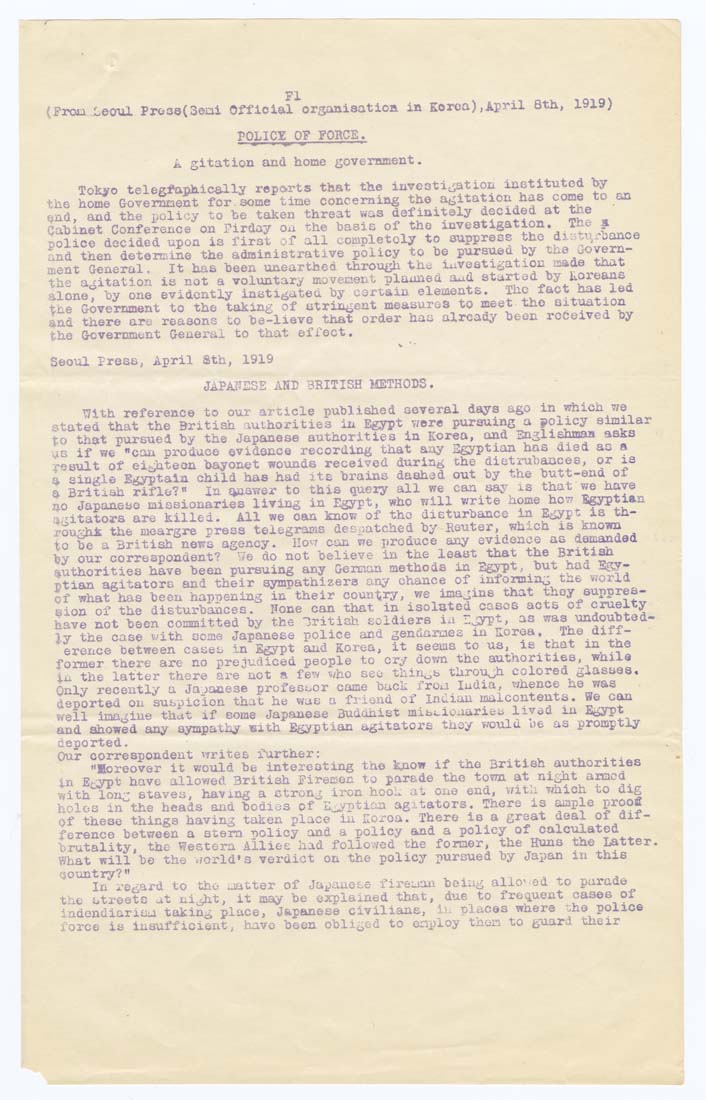Fl
(Fromieota Pross(3©ai Official organisation in Korea),April Sth, 1919)
PO_LICT OF FORCE.
A gitation and home government.
Tokyo telegraphically reports that the investigation instituted by
the home Govei^ent for. some time concerning the agitation has come to an
QUd, and the policy to be taken threat was definitely decided at tne
Cabinet Conference on Firday on the basis of the ^'^^estigation. The ?
police decided upon is first of all completely to suppress tho di-.t^^bance
and then detensine the administrative policy to be pursued by the govern¬
ment General. It has been unearthed through the investigation made that
the agitation is not a voluntary movement plannea aad started by Koieans
aloneT by one evidently instigated by certain elements. The fact has led
the Givernment to the taking of stringent measures to meet the situation
and there are reasons to be-lieve that order haa already been roeeived by
the Government General to that effect,
Seoul Press, April Sth, 1919
JAPANESE AND BRITISH METHODS.
With reference to our article published several days ago in which we
stated that the British authorities in Egypt were pursuing a policy similar
to that pursued by the Japanese authorities in Korea, and Itoglxshniaa asks
us if we "can produce evidence recording that aay Egyptian has died ao a
result of eighteen bayonet wounds received during the dietrubaaces, or is
a single Egyptaln child has had its brains dashed out by the butt-end of
a British rifle?" In sjaswer to this query all we can say is that we have
no Japanese missionaries living in Egypt, who will write home how Egyptian
I-itators are killed. All we oan know of the disturbance in Egypt is th-
rouKhi the meargre press telegrams des:;atched by Router, which is known
to be a British news agency. How can we produce any evidence as demoded
Isy our correspondent? V('e do not believe In the least that the British
authorities have been pursuing any German methods in Egypt, but had Sgy-
Ctian agitators and their sympathizers any ohance of informing the world
of what has been hapnening in their country, we imagms that thoy suppres¬
sion of the disturbances. Hone can that in isolgted cases acts or cruelty-
have not been committed by the Iritish soldiers ia Egypt, as was undoubted¬
ly the oase with some Japanese police and gendarmes in Korea, The dift-
erenoe between cases in Egypt and Korea, it seems to us, is that m the
former there are no prejudiced people to cry dovm tho authorities, while
in the latter there are not a few who see things tUrouJi colored glasses.
Only recently a Ja.janese profesaor came back from India, whence he was
deported on suspicion that he was a friend of Indian malcontents. We can
well imagine that if some Japanese Budohist misi-ioaanea lived m Egypt
and showed any sympathy with Egyptian agitators they woulu oe as promptly
deported.
Our correspondent writes l^irther: ., ..^. v. *i, -^^^o
"Horeover it would be interesting tho lyiow if the British authorities
in Ef-arpt have allowed British Firemen to parade the town at night axtacd
with long staves, having a strong iron hool. at one end, wita which to dig
holes in the heads and bodies pf E^^yptian agitators. There is ample proofi
of these things having taken place in Koroa, There is a great deal of dif¬
ference between a stern -oolloy and a policy and a policy of calculated
brutality, the Western Allies had follo.ved the former, the Huns the Latter.
What will bo the v/orld's verdict on the policy pursued by Japan m this
'4Dimtrv"^ 0
In regard to tho iiatter of Japaneae fireuan being alio- ed to parade
the streets at ni,5ht, it may be explained that, due to frequent cases of
indendiarism taking place, Japanese civilians, in places where the police
force is insufficient, have been obliged to employ them to g-uard their
|








